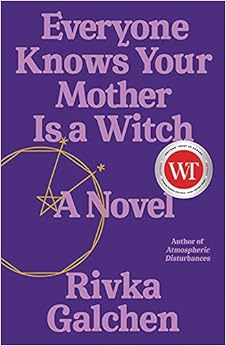4.5 Stars
In the early 17th century in the German town of Leonberg, a woman was accused of being a witch. That woman was Katharina Kepler, the mother of the famed German astronomer, Johannes Kepler. This is a fictionalized account of her story.
Katharina Kepler is accused of poisoning the wine of Ursula Reinhold and thereby causing her chronic pain. As the accusation becomes public knowledge, more and more people come forward arguing that they too have seen evidence of her sorcery. Katharina’s only allies are her three children, Johannes (Hans), Christoph, and Greta, and her neighbour, Simon Satler, who becomes her legal guardian.
Three perspectives are given. Katharina tells her version of events to Simon who writes down her story: “This manuscript is for after my case has ended, whatever the outcome.” Then Simon explains his relationship with Katharina and finishes her story after the trial. And the testimony of various townspeople is presented; these are presented as court transcriptions.
Katharina does not conform to societal norms. Though widowed and illiterate, she is wealthy (having inherited her father’s house) and has three successful children, including a son who is the Imperial Mathematician. She is intelligent, stubborn, and independent. One man criticizes her behaviour: “Widows generally keep to themselves and don’t go here and there all over town like a whirligig. Frau Kepler has been more like a man in her out-and-aboutness.” She is outspoken and offers her opinion and advice even if not asked. Simon notes her “intrusive nature” when he mentions that “Katharina was decisive as a ship captain: calling out plans in what I now recognize as her usual off-putting way.” Katharina lives with Johannes for a while; at the end of her stay, he says, “’How could this happen to Mama, who works so hard, who is kind even to animals, who never complains, who never uses foul language, who has no troubles with drink? . . . But how has Mama, who has been a hardworking widow for so many years, who has been so generous to so many – how has she been so viciously turned on? . . . But living again with you here, I remember. I understand. I’m not surprised.’” And Katharina herself sees her tendency to speak in such a forthright manner “like a child who doesn’t understand the intersection of tactics and truth.”
Katharina’s bold and meddlesome ways make her a perfect scapegoat since it is easy to demonize someone, especially a woman, who does not behave as expected. The evidence against her is hearsay which sees to grow more and more outlandish. Many of the accusers are jealous or greedy. For instance, the schoolmaster attended school with Johannes and he interprets Katharina’s behaviour as wanting “to make me feel [Johannes’] success over my own. . . . Here I have worked so hard in my life, and faced so much adversity.” Ursula’s motivation is financial compensation: While in prison, Katharina must pay her two guards, and Ursula’s husband writes to the governor asking that she be given only one guard so “this draining of funds more properly destined to victims be halted.”
The novel emphasizes the powerlessness of women. Though Katharina is a mature woman who has successfully raised a family on her own, she has to have a man serve as her legal guardian in all official proceedings. In a man like her son Johannes, intelligence and determination are seen as signs of genius; because she is a woman, those traits make her a witch. Intelligent, independent women were perceived as dangerous and needed to be silenced.
The book also examines “the destructive power of rumor.” Simon describes Katharina’s accusers as “the guild of rumormongers. The society of theft-by-accusation. People are stupid, sure, they’re ignorant, yes, they’re greedy, okay – but these people are fine with basically murdering her if it suits them.” People who are resentful, jealous and/or greedy start false rumors and make unfounded accusations. These rumors spread quickly, “You rarely see a spider spinning a web, you more often see webs already spun.” Then others looking to find an explanation for their own suffering or misfortune join the bandwagon. Simon concludes, “If you see someone as a monster, it is as good as attaching a real horn to them and poking them with a hot metal poker. . . . In order to avoid turning people into monsters by suspecting them of being monsters, I do my best to keep myself mostly to myself.”
There are numerous parallels between this story of 400 years ago and today. In the novel people believe the strangest stories about Katharina with no evidence whatsoever. Today people scorn science by disavowing the safety of vaccines, accept ridiculous QAnon conspiracies, and believe that the 2020 American presidential election was stolen, despite all evidence to the contrary. We, like the characters in the novel, live in a culture of fear and misinformation and scaremongering.
Despite the novel’s serious themes, there are some wonderful humourous moments. Katharina’s observations about others are wonderful. She notices that the governor has a lot of silver and she comments, “I doubt all the silver objects were gifts from his mother.” She gives people descriptive titles: “the Werewolf Ursula, her horrible forest administrator brother the Cabbage, the dog-killing False Unicorn ducal governor.” Then there’s the more subtle humour: a woman making a false accusation against Katharina doesn’t see the irony of saying “Many false charges are made” when it is mentioned that her husband is being charged with theft. I loved Simon’s comment that “a note had been nailed to [Katharina’s] door, complaining of the weeds traveling. Everyone thinks himself a Luther.”
This book is highly recommended. It is entertaining and thought-provoking; though set in the 17th century, it has relevance to the 21st.

I've got to think this is a book for our times. I had ot heard of it until your review.
ReplyDelete